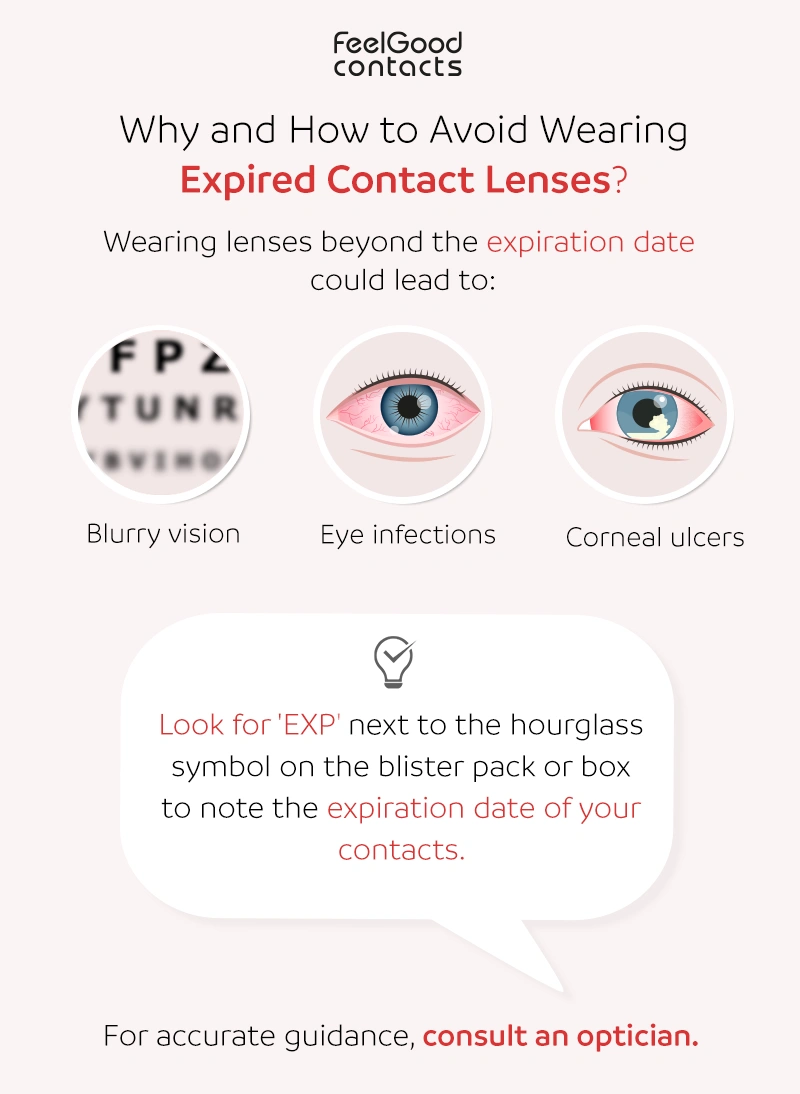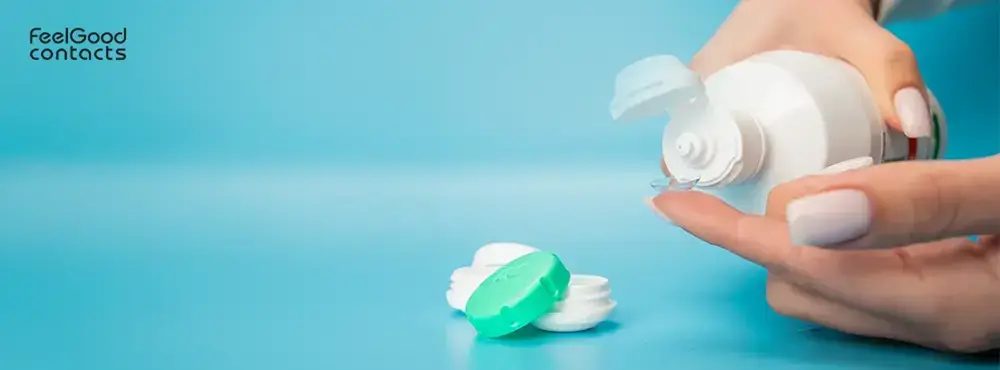Yes, contact lenses do expire and should not be worn after their expiration date. All contacts come with an expiration date, and it’s essential to be mindful of their shelf life before using them. Whether you're a first-time buyer or an experienced contact lens wearer, being aware of the expiration date is essential for maintaining eye health and avoiding potential problems.
Tina Patel, Contact Lens Optician at Feel Good Contacts, says, “The expiration date is a requirement for medical devices, such as contact lenses, to ensure the product is safe for the consumer. Wearing expired contact lenses can cause eye infections, making it important for wearers to always be mindful of the expiration date of their contact lenses.”
In this comprehensive guide, we'll cover why contact lenses expire, how to identify the expiration date, what to do if you've accidentally worn expired lenses, and much more.
Why do contact lenses expire?
Contact lenses themselves do not actually expire, but the sterile saline solution inside the blister pack does. This solution is crucial for keeping the lenses sterile and safe to use. Over time, the solution can go bad, losing its ability to keep the lenses germ-free and safe for use. This could increase the risk of contamination, leading to potential eye infections. Beyond the expiration date, the lens material can also affect the comfort and fitting of the lenses.
Contact lenses are small medical devices that must be handled and stored with care. They are sterilised and packed in an air-tight blister pack containing saline solution during their manufacturing. Based on how long the saline solution and packaging can stay in the same condition, an expiration date is assigned to contact lenses.
How to find the expiration date on contact lenses?
The expiration date is typically found on the contact lens blister pack and the packaging box, alongside other specifications like base curve, diameter, and power. It is usually marked with the "EXP" abbreviation next to the hourglass symbol, and is displayed in the format YYYY-MM.

How many years can contact lenses last?
The shelf life of contact lenses varies based on their respective brand and type. Generally, unopened blister packs last between 1-4 years from the manufacturing date. It is vital to check the expiration date before using contact lenses, especially for those who purchase them in bulk or switch brands frequently.
Can I use expired contact lenses?
No, you should avoid using expired contact lenses. The solution in the blister pack can deteriorate over time, increasing the risk of eye infections, corneal ulcers and other eye problems. If in doubt, reach out to your optician for the required assistance or Feel Good Contacts’ customer support at:
Phone - 0800 458 2090
Email - cs@feelgoodcontacts.com
What should I do if I have accidentally worn expired contact lenses?
If you've accidentally worn expired lenses, do not panic and take the following steps as soon as possible:
- Thoroughly wash and dry your hands.
- Remove the lenses immediately and discard them.
- Rinse your eyes with a saline solution to clear out potential contaminants.
- Check for any discomfort, including pain, redness, blurred vision or photophobia (light sensitivity).
- If any of these symptoms persist, contact your optician immediately for advice.
What are the effects of wearing expired contact lenses?
There can be many adverse effects of wearing expired contact lenses, including:
How to dispose of expired contact lenses?
You must dispose of expired contact lenses as per your local recycling guidelines. Avoid flushing them down a sink or toilet as it can contribute towards environmental pollution.
How to check if a contact lens is damaged, even if it hasn’t expired?
Even if a contact lens hasn’t expired, it may still become damaged. Look for the following signs to determine if a contact lens is damaged:
- Difficulty seeing clearly through the lenses – If you are unable to see clearly through your lenses, discard them and try another pair from the same packet. You can also try rinsing your lenses with a lens solution or eye drops. If the problem persists, it could be due to a change in your contact lens prescription.
- Visible tears or splits in the lens – Avoid using the lenses if you notice visible signs of damage.
- Warped or discoloured lenses – If the lenses appear warped, discoloured or cloudy, they are certainly not fit to use, even if they haven’t expired.
If you experience any of these issues, discard the lenses immediately to prevent eye infections. Always keep a tab on when to replace your contact lenses. If you're unsure, it’s best to seek advice from your optician.

Stay on top of your eye health with Feel Good Contacts
Feel Good Contacts stocks safe-to-wear dailies, monthlies, and two weekly contact lenses from top-selling brands at budget-friendly prices that meet your prescription needs, lifestyle and individual requirements. Do not forget to subscribe to our newsletter to stay informed about eye health through our informative Eye Care Hub articles.
Disclaimer: The advice in this article is for informational purposes only and does not replace medical care or an in-person check-up. Please check with an eye care professional before purchasing any products. For information on our article review process, please refer to our Editorial Policy.

 Offers
Offers Account
Account
 Favorite
Favorite
 Basket
Basket

 OFFERS
OFFERS


















